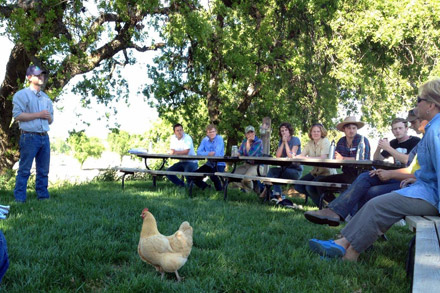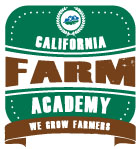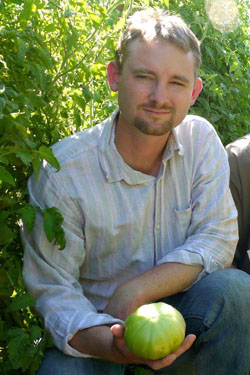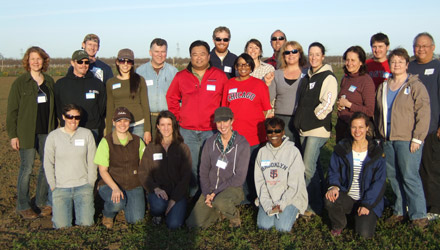Growing a New Crop of Farmers
Janet McGarry, CUESA Volunteer
May 18, 2012
 The California farming community is facing a demographic crisis. The average age of a California farmer is 58, and nearly 20 percent of them are 70 or older. As these farmers approach retirement, California needs to train new ones if we are to continue to feed our country and keep a healthy rural economy in the decades ahead. And with farm internships in California subject to strict labor laws, opportunities to get a hands-on farming education have become even fewer.
The California farming community is facing a demographic crisis. The average age of a California farmer is 58, and nearly 20 percent of them are 70 or older. As these farmers approach retirement, California needs to train new ones if we are to continue to feed our country and keep a healthy rural economy in the decades ahead. And with farm internships in California subject to strict labor laws, opportunities to get a hands-on farming education have become even fewer.
To help meet this need, the Center for Land-Based Learning in Winters recently launched the California Farm Academy (CFA) to train beginning farmers in specialty crop production. The six-month incubator program is designed to help aspiring agriculturists transition quickly into starting their own farms. Unlike many programs and apprenticeships that require students to participate full-time or live on a farm, the CFA meets on evenings and Saturdays to accommodate the busy schedules of people who currently work at non-farming jobs. Academy students spend time in the classroom as well as in the field, greenhouse, and packing shed.
 To provide perspectives from the frontlines, the CFA has teamed up with local farms such as Ferry Plaza seller Capay Organic, which also markets produce through its Farm Fresh to You CSA and Ferry Building store. Second-generation farmer Thaddeus Barsotti (pictured below)i, co-owner of Capay Organic with his brother Freeman, volunteers as a teacher for the Academy, and the farm serves as a site for classes and demonstrations.
To provide perspectives from the frontlines, the CFA has teamed up with local farms such as Ferry Plaza seller Capay Organic, which also markets produce through its Farm Fresh to You CSA and Ferry Building store. Second-generation farmer Thaddeus Barsotti (pictured below)i, co-owner of Capay Organic with his brother Freeman, volunteers as a teacher for the Academy, and the farm serves as a site for classes and demonstrations.
When Barsotti learned about the new incubator program, he welcomed the opportunity to contribute to the education of new growers in California. Although he trains and hires workers as part of his farm business, he realizes that his farm cannot grow forever. In his work with the Academy, Barsotti can help “grow new farmers” who will start their own businesses with economic viability and sustainability in mind.
Other experienced farmers from several farms in the area, professors from the University of California at Davis, and National Resource Conservation Service employees teach Academy students the fundamentals of sustainable farming: field preparation, crop planning, soil management, pest control, irrigation, and equipment use. In the classroom, experts from organizations such as the California Alliance for Family Farmers and California Certified Organic Farmers teach students how to handle legal and financial issues, identify and develop markets for their crops, and hire, train, and manage farmworkers.
 Barsotti recognizes that it is difficult for beginning farmers to understand how a farm works if they haven’t lived on one before. “If I hadn’t grown up on a farm, I wouldn’t be in the business,” he says. He believes the program gives students “an appreciation for the amount of expertise that goes into modern farms,” and serving as a mentor has also renewed his own appreciation for his line of work. “Teaching others has reminded me of how complicated the whole thing is,” he reflects. “There are a lot of details that go into farming. Farmers are always making decisions based on a set of circumstances that are never the same.”
Barsotti recognizes that it is difficult for beginning farmers to understand how a farm works if they haven’t lived on one before. “If I hadn’t grown up on a farm, I wouldn’t be in the business,” he says. He believes the program gives students “an appreciation for the amount of expertise that goes into modern farms,” and serving as a mentor has also renewed his own appreciation for his line of work. “Teaching others has reminded me of how complicated the whole thing is,” he reflects. “There are a lot of details that go into farming. Farmers are always making decisions based on a set of circumstances that are never the same.”
For their final project, students will use their new knowledge to develop business plans that they will present to a panel of farmers and lenders prior to graduation. Similar to the farm training and incubator program at Agriculture and Land-Based Training Association (ALBA), the Academy will provide support to graduates after their initial six-month program by offering them the opportunity to lease land at the Center for Land-Based Learning and at Russell Ranch, located at the University of California at Davis. They can lease ¼- to ½-acre plots at half the market rate for up to three years.
CFA director Jennifer Taylor explains that the first five years is a critical time for new farmers. “The Farm Academy can take some of the luck and uncertainty out of it and provide a scaffold for beginning farmers,” she says.
Graduates of the program who are renting land will be able to ask for guidance and advice from experienced farmers at the two locations. By farming plots near each other, they can also connect with other program alumni and create a support network. Taylor notes that students have already started talking about working together and sharing equipment.
 Traveling from as far as San Francisco each week, the 20 students in the Academy’s first class range from young people just entering the workforce to midlife career-changers. Students come from diverse backgrounds, motivated by a love of farming as well as an interest in raising a family on a farm, working with youth, or agritourism. Some plan to farm a small one-acre plot, while others hope for hundreds of acres.
Traveling from as far as San Francisco each week, the 20 students in the Academy’s first class range from young people just entering the workforce to midlife career-changers. Students come from diverse backgrounds, motivated by a love of farming as well as an interest in raising a family on a farm, working with youth, or agritourism. Some plan to farm a small one-acre plot, while others hope for hundreds of acres.
Taylor, who previously worked at an incubator program that trained beginning dairy farmers in Wisconsin, would love to see more programs like the CFA spring up in other parts of California. She envisions hubs around the state that would connect beginning farmers with regional farms and resources for mentorship and support. The last farm bill allocated money for programs that train beginning farmers, and Taylor hopes the next farm bill will continue to fund these efforts. The CFA is funded by a grant from the California Department of Food and Agriculture’s Specialty Crop Block Grant program, which is also dependent on authorization in the next farm bill.
The first session of the Farm Academy began in February and runs through August 2012. Session two will begin in late 2012 or early 2013. An application and information can be found at the Center for Land-Based Learning’s website.
Photos courtesy of Capay Organic/Farm Fresh to You.
